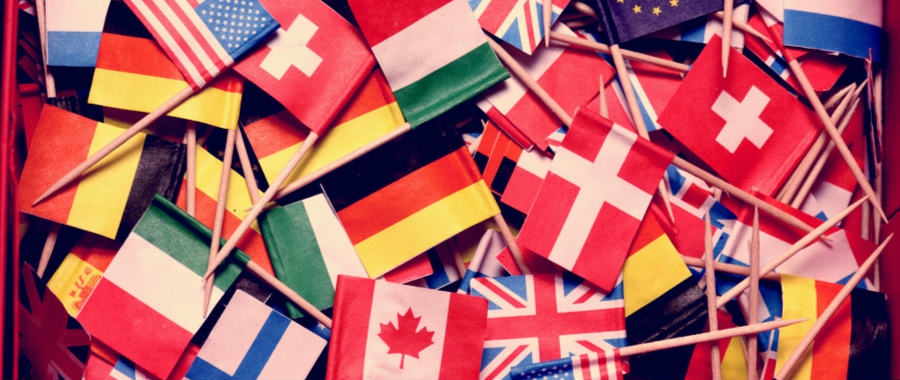The views expressed in our content reflect individual perspectives and do not represent the authoritative views of the Baha'i Faith.
The age of nations has passed, the Baha’i teachings say—and yet we still have a world run primarily by anachronistic national governments:
How pathetic indeed are the efforts of those leaders of human institutions who, in utter disregard of the spirit of the age, are striving to adjust national processes, suited to the ancient days of self-contained nations, to an age which must either achieve the unity of the world, as adumbrated by Baha’u’llah, or perish. – Shoghi Effendi, The World Order of Baha’u’llah, p. 36.
Shoghi Effendi’s striking description of “the ancient days of self-contained nations,” written in the 1930s, hearkens back to an era before most people understood that international trade and commerce would make all nations interdependent. So—when did that interdependence between nations actually begin to occur?
Many historians maintain that interdependence started to happen a little more than a hundred years ago in 1917, when a previously uninvolved, “neutral” United States made the fateful decision to enter World War I:
That [America’s] resistance (to participating in the war) was vain was through no fault of ours, nor in a larger sense through the specific inclination of any nation. It was the shrinking of the earth that flung us so violently against the European continent. We had little volition in the matter.
What actually ended our neutrality long before we recognized that it had ended, was the supreme fact that the growth of industry, interlacing the nations of the world, had made a complete and real neutrality impossible. The traditional concept of neutrality had been based upon the idea of one independent and self-contained nation fighting another independent and self-contained nation, while the neutrals held the ring, kept the scales even, and did “nothing, neither way.” But today there are no economically and self-contained nations. – Walter Edward Weyl, The End of the War, p. 57.
Weyl’s landmark book—written a century ago, in 1918—was one of the first to note that the world had contracted into an interdependent globe, no longer able to draw distinct lines between “separate” peoples and countries. Many, many diplomats, futurists, thinkers and philosophers now agree with this “post-nationalism”idea—that the world has moved past its ancient, obsolete nation-state paradigm:
The age of nations has passed. Now, unless we wish to perish, we must shake off our old prejudices and build the Earth. The more scientifically I regard the world, the less can I see any possible biological future for it except in the active consciousness of its unity. – Pierre Teilhard de Chardin.
Countries may not exist as viable entities in 2050. Countries are local in their scope and suboptimal in managing change… generally ineffective hangovers.
By 2050 we will be more global in all of our interactions. Geographic boundaries will seem pointless. Political beliefs and ideologies will not be managed by a small number of people on behalf of the masses.
Social collectivism using electronic media and global interconnections will act to create dynamic groups that share common interests and objectives. This is the time that global social communication is providing the foundation to change the way people communicate, share viewpoints, manage themselves, work with others, and effect change.
One can only hope that we get to a global “government” for the global issues and have local government for issues that are local. Any organization that fits in between these two extremes will become increasingly obsolete. – Chris Smedley.
The nation-state appears to be losing its monopoly on sovereignty. … More importantly, the conditions of global life liberate individuals from the physical and psychological boundaries of the nation-state. People living in different continents possess a new familiarity with each other. This ever-increasing proximity among peoples creates a web of complex relations giving birth to new sentiments of global harmony. – Ali Khan.
These three profound thinkers aren’t alone—they represent the views of a whole host of eminent post-national voices, all of them echoing the central theme of the Baha’i teachings, the organic unity of our planet:
The people of the future will not say, “I belong to the nation of England, France or Persia”; for all of them will be citizens of a universal nationality—the one family, the one country, the one world of humanity—and then these wars, hatreds and strifes will pass away. – Abdu’l-Baha, The Promulgation of Universal Peace, p. 19.
The earth has one surface. God has not divided this surface by boundaries and barriers to separate races and peoples. Man has set up and established these imaginary lines, giving to each restricted area a name and the limitation of a native land or nationhood. By this division and separation into groups and branches of mankind, prejudice is engendered which becomes a fruitful source of war and strife. Impelled by this prejudice, races and nations declare war against each other; the blood of the innocent is poured out, and the earth torn by violence. Therefore, it has been decreed by God in this day that these prejudices and differences shall be laid aside. All are commanded to seek the good pleasure of the Lord of unity, to follow His command and obey His will; in this way the world of humanity shall become illumined with the reality of love and reconciliation. – Ibid., p. 316.
So, yes, Baha’is believe that the age of nations has passed, and the age of a universal nationality has arrived. In the next essay in this series, we’ll take a look at what that fact means for the way we govern ourselves today and tomorrow.
















Comments
Sign in or create an account
Continue with Googleor